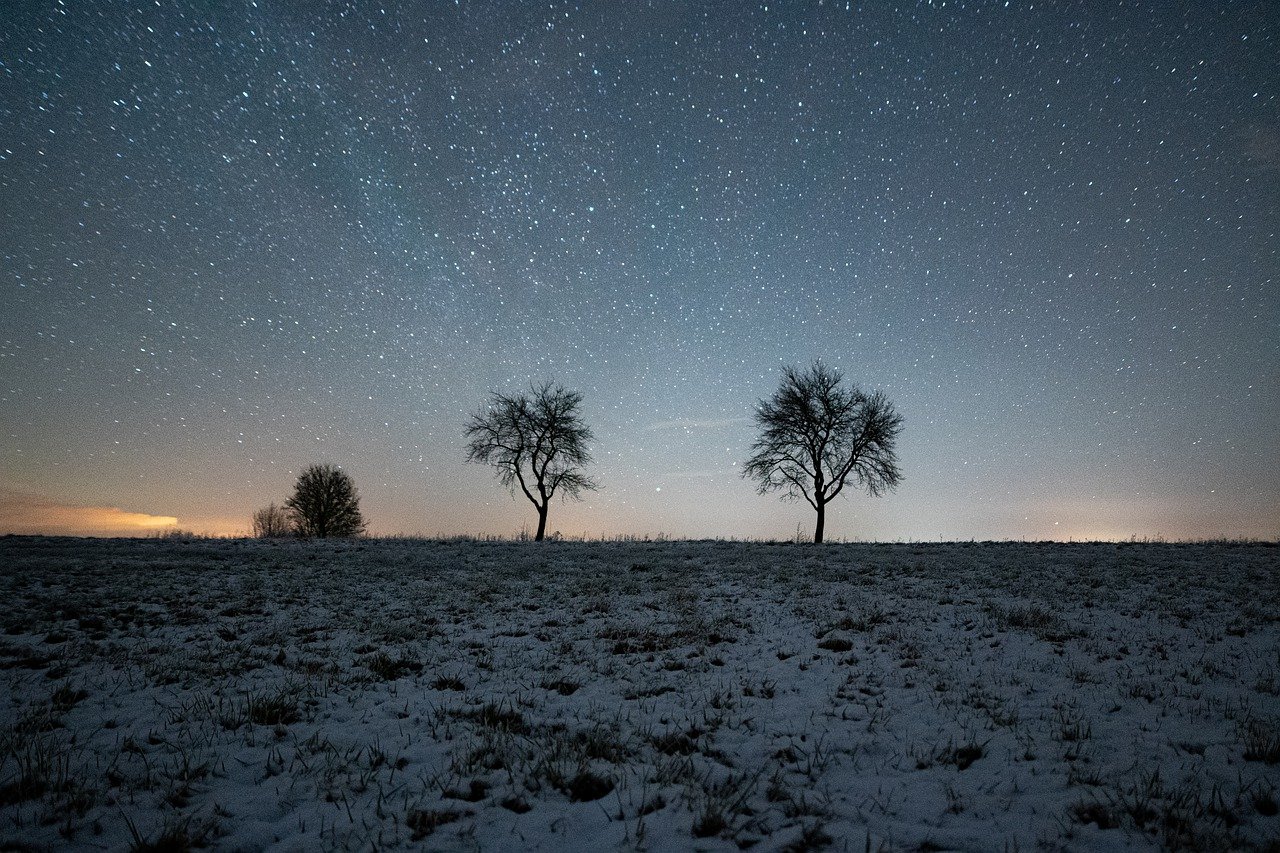
Did a gay affair stir a 14th-Century royal crisis?
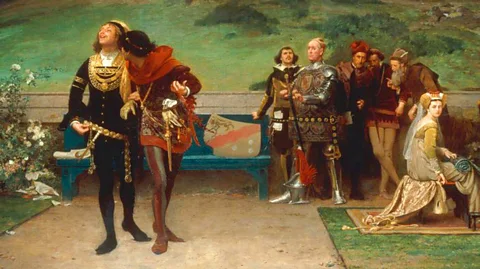 Alamy
AlamyA new revival of Christopher Marlowe's pioneering play about the 14th-Century King of England puts the spotlight back on his relationship with his male "favourite" Piers Gaveston.
This week, at its base in Stratford-upon Avon, the world-famous Royal Shakespeare Company (RSC) is opening a new production of Christopher Marlowe's Edward II. Though this influential 16th-Century play about a beleaguered queer monarch is more than 430 years old, it still feels stingingly relevant. Marlowe depicted a king whose authority and ability to rule is fatally undermined by his relationship with another man. Modern-day UK monarchs hold only ceremonial power, but overt queerness in the British royal family remains vanishingly rare. Lord Ivar Mountbatten, a second cousin of King Charles III who is currently competing on US reality show The Traitors, is widely described as "the first openly gay royal".
Marlowe's play dramatises the struggles of Edward II, a real-life King of England who reigned from 1307 to 1327. A year after Edward II succeeded his father, Edward I, he married the King of France's daughter, Isabella, in an effort to strengthen Anglo-French relations. Queen Isabella bore Edward II four children, and became a formidable figure in her own right – she is sometimes called "the she-wolf of France". But Marlowe's play really hinges on the king's controversial relationship with his male "favourite", Piers Gaveston, and how this sparked a constitutional crisis that he never recovered from.
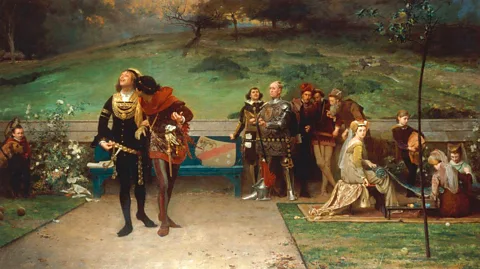 AlamyA 19th-Century painting by Marcus Stone of Edward II and Gaveston, showing them getting closer while courtiers look on (Credit: Alamy)
AlamyA 19th-Century painting by Marcus Stone of Edward II and Gaveston, showing them getting closer while courtiers look on (Credit: Alamy)The playwright never says outright that the two men are lovers, but the queer subtext is hardly subtle. In one scene, after he is reunited with his favourite, Edward beseeches him to "kiss not my hand [but] embrace me, Gaveston, as I do thee". In another, Isabella bemoans the fact "the king regards me not, but [instead] dotes upon the love of Gaveston". Only a wilfully obtuse reader of Marlowe's text could miss the insinuation that these two men are more than just friends.
Was Edward II gay?Ever since it was written, Marlowe's play has helped to cement the real-life Edward's debatable but not entirely misleading reputation as a "gay king". To put it simply, we can never know for certain whether Edward II had a romantic and/or sexual relationship with any of his male favourites. But when it was first performed in 1592, it paved the way for the monarch's queerness to be openly discussed by historians. "The earliest text we have accusing Edward of some kind of sexual transgression was written around the time Gaveston was murdered [in 1312]," historian Kit Heyam, author of The Reputation of Edward II, 1305-1697, tells the BBC. "It says that at the beginning of Edward's reign, there was 'much lechery habitually practised'."
I think in purely physical terms, we could probably call him more bisexual than gay. But emotionally, it strikes me that he probably was gay – Kathryn WarnerIn the parlance of the time, "lechery" was used to describe any kind of "sinful" sexual behaviour, according to the mores of the Catholic Church, which held religious authority in England at the time. "The text seems to be suggesting that this behaviour will stop now that Gaveston's dead, but it stops short of saying that the sexual transgression was actually between Gaveston and the king," Heyam says. In the centuries after Edward II's death, it became less risky for writers to insinuate that Edward II may have been sexually transgressive, but the invention of the printing press in the 15th Century cranked up the innuendo. "Writers would sensationalise their texts to make them more commercially appealing, so they started saying that Edward II was definitely sexually transgressive, and it was definitely the fault of his male favourites," Heyam says. "But Marlowe was the first person to join the dots, and say that Edward II was actually sleeping with them."
The actor and RSC co-artistic director Daniel Evans, who portrays Edward II in the new production, believes that Marlowe's play still feels "radical" in 2025. His interest in reviving it was piqued by director Daniel Raggett, who posed a "provocative", hypothetical question that underlines the piece's enduring relevance: "What would happen if our current king, Charles III, suddenly said: 'I know I've been married for a while, but I actually want someone called Colin by my side, not Camilla?'" It might not cause a civil war, as Edward's relationship with Gaveston begets in Marlowe's play, but Evans questions just how accepting today's "supposedly liberal and permissive society" would be. "Deep-rooted homophobia still exists, and the whole notion of the British Royal Family, of lineage and heirs, is very dependent on a heteronormative family structure," he notes.
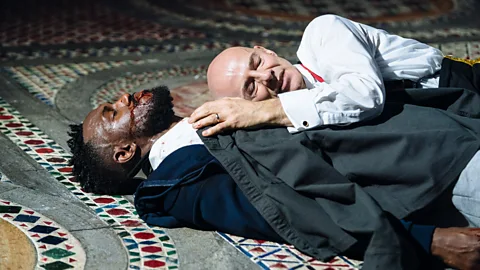 Helen MurrayThe new RSC production of Edward II stars its co-artistic director Daniel Evans (pictured right), who believes the play is still radical (Credit: Helen Murray)
Helen MurrayThe new RSC production of Edward II stars its co-artistic director Daniel Evans (pictured right), who believes the play is still radical (Credit: Helen Murray)Evans and Raggett were also intrigued by the play's late-20th-Century renaissance, which is inextricably linked with the burgeoning LGBTQ+ rights movement. Dr Will Tosh, head of research at Shakespeare's Globe, and author of Straight Acting: The Many Queer Lives of William Shakespeare, says that Marlowe's play "doesn't have a hugely long performance history" outside of the era in which it was written. He notes that in the 18th and 19th centuries, it essentially went "into cold storage" because the idea of a male monarch having a male lover would have been anathema to conservative Georgian and Victorian audiences. The play's subsequent revival in the second half of the 20th Century coincides with a "more curious and less judgmental attitude to queer intimacy", Tosh says.
Boundary-breaking productionsIn 1969, two years after male homosexuality was decriminalised in England and Wales, but 11 years before the same advance was made in Scotland, Ian McKellen portrayed Edward II in a Prospect Theatre Company production that toured the UK. Gaveston was played by James Laurenson, a New Zealand actor who died last year, and their on-stage kiss caused some controversy when the production arrived in Edinburgh. "The late councillor John Kidd took offence to this show of male affection, particularly as it took place on a stage erected within the assembly hall of the Church of Scotland," McKellen recalls on his website. Though a couple of local policemen were sent to watch the production, McKellen notes that they found "no problem" with its contents and this brief fuss "guaranteed full houses for the run."
When this production was broadcast on the BBC a year later, it made history by including the first same-sex kiss ever shown on British television. In a 2017 interview, McKellen said that the Prospect production also had a profound impact on "many, many Americans" who watched it on US network PBS. "They saw for the first time in their lives two men kissing and couldn't believe it, but took comfort from it," he said.
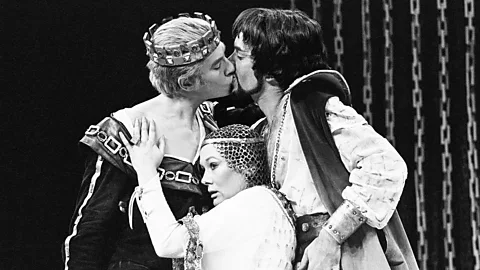 AlamyIan McKellen and James Laurenson's same-sex kiss on stage in a 1960s production of the play, which was later televised on the BBC, was a landmark moment (Credit: Alamy)
AlamyIan McKellen and James Laurenson's same-sex kiss on stage in a 1960s production of the play, which was later televised on the BBC, was a landmark moment (Credit: Alamy)The play's place in the queer canon was further cemented by a 1991 film adaptation directed by artist and gay rights activist Derek Jarman. Featuring a deliberately anachronistic mix of modern and medieval props, costumes and backdrops, Jarman's film dials up Marlowe's homoeroticism, and reframes the story within the context of the contemporary LGBTQ+ rights movement. As Gaveston (played by Andrew Tiernan) is tortured for his transgressions, Jarman shows police clashing with protesters from gay-rights group OutRage!.
More like this:
• "He was a monster": How history got Henry VIII wrong
• The redemption of America's most vilified First Lady
• The historic female gang who menaced London
A year before Jarman's film, Marlowe's play was staged by the RSC with Simon Russell Beale in the title role. Angela K Ahlgren argues in her 2011 essay Performing Queer Edward II in the 1990s that Jarman's film and this RSC revival of the play "reflect notions of queerness circulating in the 1990s because they stage violence, same-sex desire, and references to contemporary gay political issues". At the time, the HIV/AIDS epidemic was devastating the gay male population globally, and queer activists in the UK were protesting against Section 28, a piece of legislation that prohibited the supposed "promotion of homosexuality" by schools and local councils. It had been enacted by Margaret Thatcher's Conservative Government in 1988, following a rising tide of anti-gay sentiment in the media.
Fact v fictionStill, Marlowe's play should never be regarded as a work of historical gospel. Tosh says the playwright's "major dramatic innovation" is to make the king's relationship with Gaveston the "central drama" of his life by "compressing the timeline". In reality, Edward II cultivated relationships with other highly influential male favourites after Gaveston was murdered in 1312, just five years into his 19-year-reign. But Marlowe depicts his bond with Gaveston as by far the most emotionally significant. "After Gaveston's death in the play, Edward invokes his memory to justify whatever he's doing. And later, when Edward is imprisoned and mistreated, he invokes Gaveston's name again as a plea for salvation," Tosh says.
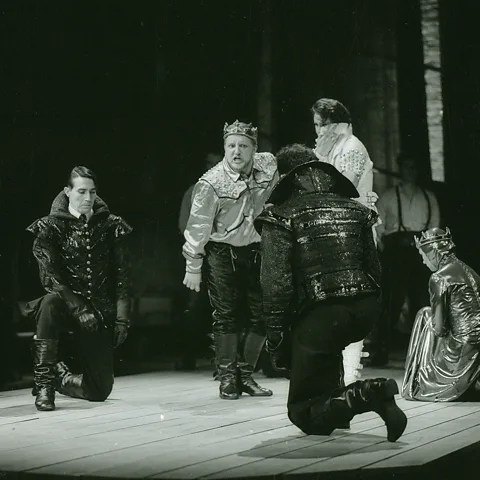 Joe Cocks Studio Collection/ Shakespeare Birthplace TrustSimon Russell Beale portrayed Edward II in the RSC's 1990 production, which reflected the era's gay politics (Credit: Joe Cocks Studio Collection/ Shakespeare Birthplace Trust)
Joe Cocks Studio Collection/ Shakespeare Birthplace TrustSimon Russell Beale portrayed Edward II in the RSC's 1990 production, which reflected the era's gay politics (Credit: Joe Cocks Studio Collection/ Shakespeare Birthplace Trust)Of course, Marlowe's play also invites us to make serious presumptions about the nature of the two men's relationship. Historian Kathryn Warner, author of Edward II: The Unconventional King, says we can never know for certain how Edward II felt about Gaveston and his other male favourites because the king didn't keep a diary or write personal letters. "All we have is the word of outsiders, which is obviously open to interpretation," she says. But in all likelihood, given that he fathered an illegitimate child with an unknown woman, Edward II's sexuality was probably more complicated than his reputation as a "gay king" might suggest. "I think in purely physical terms, we could probably call him more bisexual than gay," Warner says. "But emotionally, it strikes me that he probably was gay, because he was very, very close to his male favourites."
I hope audiences who see this play think deeply about what happens when you try to ban love and sublimate someone's natural way of being – Daniel EvansThis closeness almost certainly caused his downfall. According to Heyam, Edward's fundamental error throughout his reign was to grant his favourites too much power. "He failed to realise that being king of England in the 14th Century is very much a manager's job," they say. "Edward needed to keep a number of powerful nobles happy, but when he gave Gaveston power over them, he made them very angry." After Gaveston was murdered by a group of rival barons in 1312, Edward II made the same mistake again with Hugh Despenser the Younger, whom Warner describes as "the last and most powerful" of his male favourites.
It's worth noting that Despenser does appear in Marlowe's play, but only as a relatively minor character called Spencer who is essentially a stand-in for Gaveston following his death. The real-life Despenser had much more agency. In 1324, amid growing tensions with France, he began to wield his influence against Queen Isabella because of her French heritage. Isabella fought back with support from her own favourite, Richard Mortimer, which ultimately led to Despenser's execution in 1325, and Edward II's forced abdication the following year. "If he had just kept his public and private lives separate, he would probably have been fine," Heyam says.
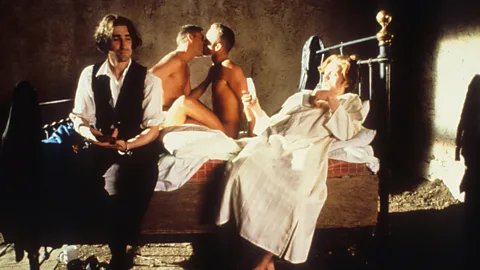 AlamyCelebrated gay British filmmaker Derek Jarman made a film of Edward II, that mixed medieval and modern settings (Credit: Alamy)
AlamyCelebrated gay British filmmaker Derek Jarman made a film of Edward II, that mixed medieval and modern settings (Credit: Alamy)In Marlowe's play, the fallen monarch is killed at Mortimer's behest by a red hot poker through his anus. Warner says the idea that Edward II was murdered in this way is "almost certainly a myth" – one Marlowe didn't invent, but definitely helped to "popularise". Over 430 years later, it remains a shocking image with crassly homophobic overtones. But even if Marlowe's poker scene is apocryphal, the play still has a lot to say about the consequences of intolerance. When Edward complains about being forced to "leave my Gaveston", the disapproving Earl of Lancaster replies derisively: "Diablo, what passions call you these?" His use of the Spanish word for "devil" is surely no accident. "I hope audiences who see this play think deeply about what happens when you try to ban love and sublimate someone's natural way of being," Evans says. "The endless cycle of violence that this can create is something we can all learn from today."
Edward II is at the Swan Theatre, Stratford-upon-Avon until April 5, rsc.org.uk
--
If you liked this story, sign up for The Essential List newsletter – a handpicked selection of features, videos and can't-miss news delivered to your inbox every Friday.
For more Culture stories from the BBC, follow us on Facebook, X and Instagram.
TheatreBritishHistoryRoyalLGBTFeaturesWatch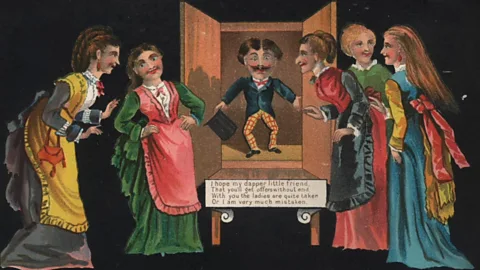 The insulting 'Vinegar Valentine' of Victorian England
The insulting 'Vinegar Valentine' of Victorian EnglandValentine’s Day is thought to celebrate romance but rude cards soured the holiday for its recipients.
14 Feb 2025History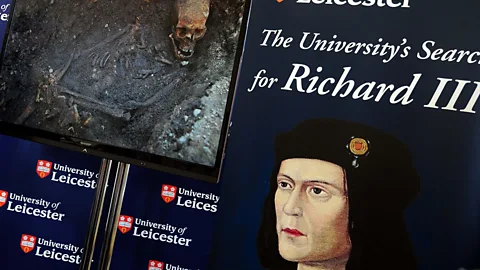 Richard III: The 'accidental' photo of a long-lost king
Richard III: The 'accidental' photo of a long-lost kingWhy a famous photograph of King Richard III's skeleton was a happy 'accident'.
11 Feb 2025History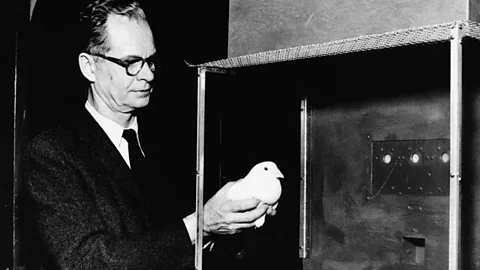 The WW2 experiment to make pigeon-guided missiles
The WW2 experiment to make pigeon-guided missilesAn unexpected WW2 experiment by behaviourist B F Skinner proved that pigeons could be used for missile guidance.
4 Feb 2025History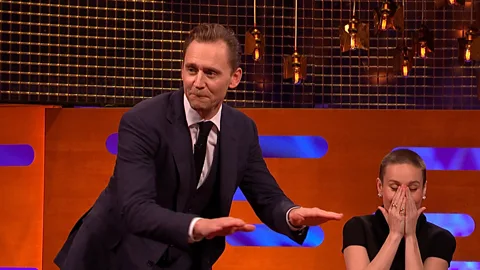 Tom Hiddleston busts out signature dance move
Tom Hiddleston busts out signature dance moveTom Hiddleston gives a demo of his signature move, which he calls 'just keep swimming'.
14 Jan 2025Theatre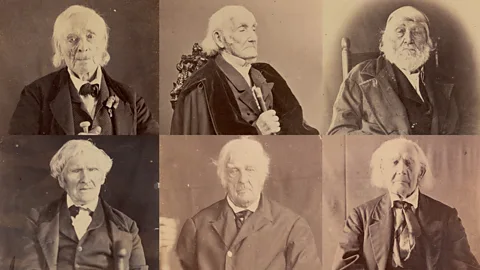 America's last Revolutionaries: Rare photos of US patriots
America's last Revolutionaries: Rare photos of US patriotsHow a dwindling group of veterans from the American War of Independence were featured in early photographic form.
7 Jan 2025History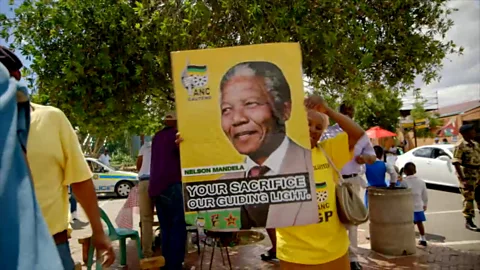 Idris Elba on moment he learned about Mandela's death
Idris Elba on moment he learned about Mandela's deathThe actor recalls being at the Mandela film premiere when he heard the anti-apartheid politician had died.
7 Dec 2024History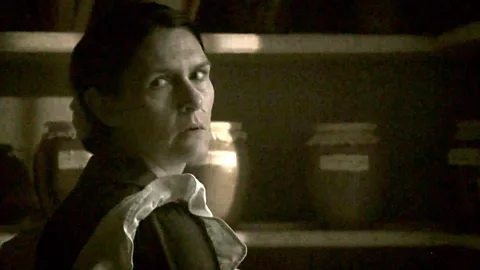 Mary Mallon: 'The most dangerous woman in America'
Mary Mallon: 'The most dangerous woman in America'How Mary Mallon, an Irish cook for New York's elite, became known as the 'most dangerous woman in America'.
17 Nov 2024History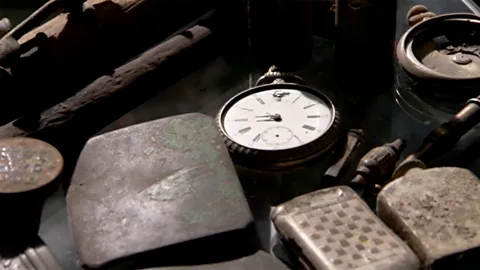 World War One relics live on in the fields of Europe
World War One relics live on in the fields of EuropeThe battlegrounds of World War One are still giving up their revealing evidence of bitter fighting.
12 Nov 2024History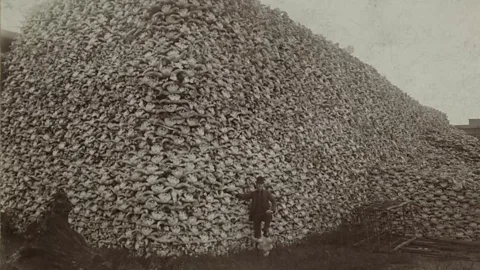 The picture that tells a lesser-known chapter of US history
The picture that tells a lesser-known chapter of US historyHow a 1892 photo from Rougeville, Michigan, became the most iconic image of the bison massacre in America.
22 Oct 2024History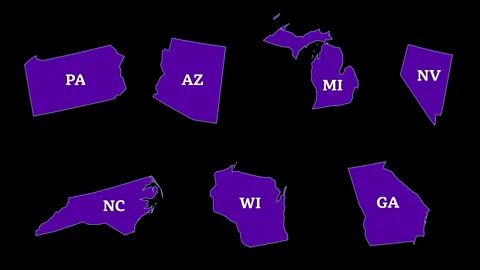 The history of swing states in the US
The history of swing states in the USThe US Presidential elections did not always depend on just these seven states.
21 Oct 2024History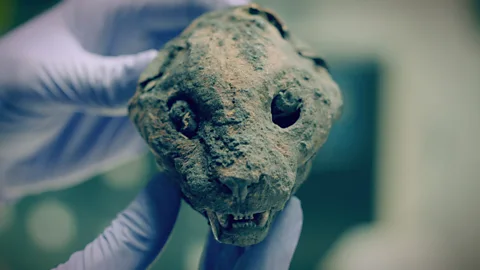 Why tonnes of mummified cats ended up in England
Why tonnes of mummified cats ended up in EnglandIn 1890 an estimated cargo of 180,000 ancient felines, weighing 19.5 tonnes, were auctioned off in Liverpool.
18 Sep 2024History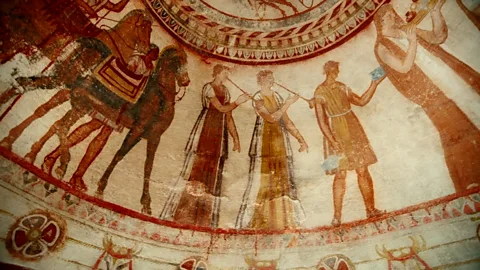 Inside the ancient royal tomb found by accident
Inside the ancient royal tomb found by accidentThe Thracian Tomb of Kazanlak was accidentally discovered by Bulgarian soldiers digging up shelters in 1944.
11 Sep 2024Archaeology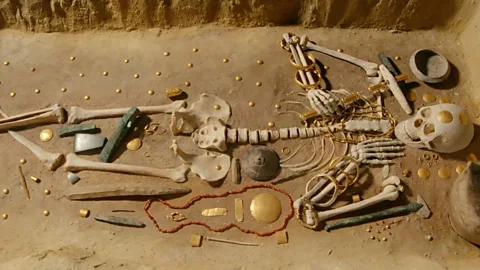 Varna Necropolis: World's oldest gold treasure
Varna Necropolis: World's oldest gold treasureThe Varna treasure is considered the world's oldest human processed gold, dating back 6,500 years.
10 Sep 2024Archaeology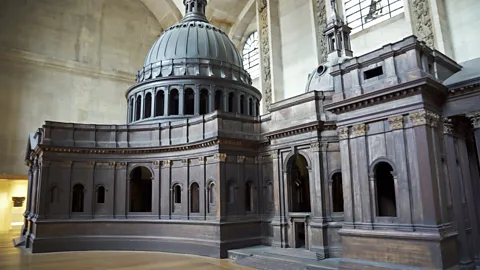 The giant 350-year-old model of St Paul's Cathedral
The giant 350-year-old model of St Paul's CathedralHiding in a London cathedral is an intricate wooden mock-up of Sir Christopher Wren's masterpiece.
5 Sep 2024History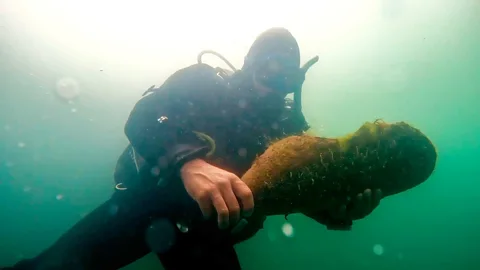 Uncovering the sunken relics of an ancient city
Uncovering the sunken relics of an ancient cityBettany Hughes goes underwater in search of ancient archaeological finds in historic Sozopol, Bulgaria.
4 Sep 2024Archaeology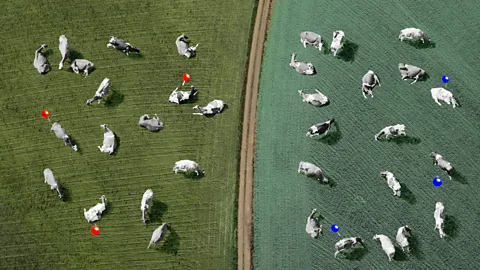 Texas fever: The lesser-known history of the US border
Texas fever: The lesser-known history of the US borderIn 1911, a fence was constructed on the US-Mexico border. But its purpose was not to stop humans.
18 Aug 2024History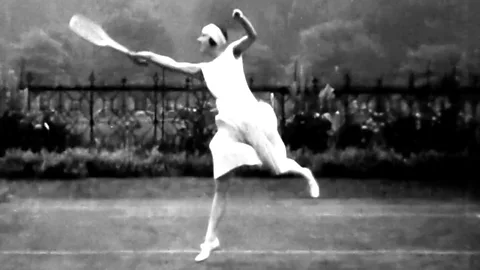 Century-old Olympics footage brought back to life
Century-old Olympics footage brought back to lifeA look through footage from the Paris 1924 Olympics gives viewers a chance to reflect on how much has changed.
9 Aug 2024Sport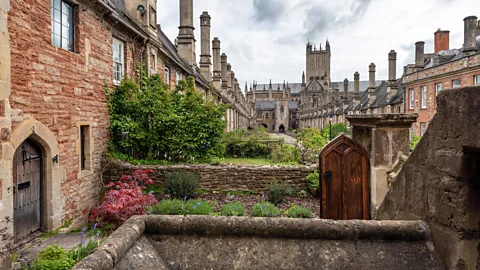 The rare medieval street about to reveal its secrets
The rare medieval street about to reveal its secretsOne of Europe's oldest residential streets hides in the heart of the English countryside.
23 Jul 2024History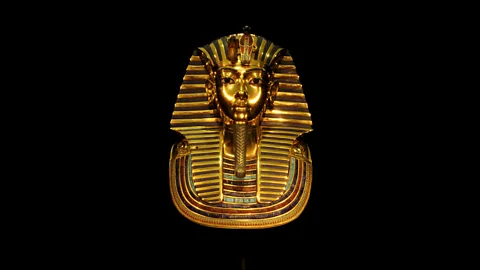 Tutankhamun: The first ever view inside the tomb
Tutankhamun: The first ever view inside the tombOne month after the famous discovery, photographer Harry Burton recreated the first view of Tutankhamun's tomb.
5 Jul 2024History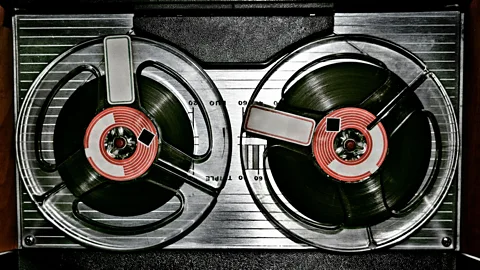 Listen to the oldest known recording of a human voice
Listen to the oldest known recording of a human voiceThomas Edison wasn't the first person to record sound. It was a Frenchman who invented sound recording in 1857.
3 Jul 2024HistoryMore13 hrs ago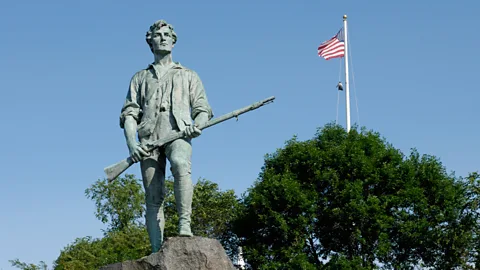 The quiet towns that sparked US independence
The quiet towns that sparked US independenceTwo hundred and fifty years ago, several small farming communities rose up against the British and helped form a new nation. Now, the towns are gearing up to party like it's 1775.
13 hrs agoTravel16 hrs ago The smart guide to emotional control
The smart guide to emotional controlEthan Kross is a world expert in the psychology of emotions, and he has identified a set of tools that can help us to tend our wellbeing.
16 hrs agoFuture20 hrs ago Man's ice climb with no experience was 'tiring'
Man's ice climb with no experience was 'tiring'Steve Gay says his challenge had been "a great experience".
20 hrs agoJersey20 hrs ago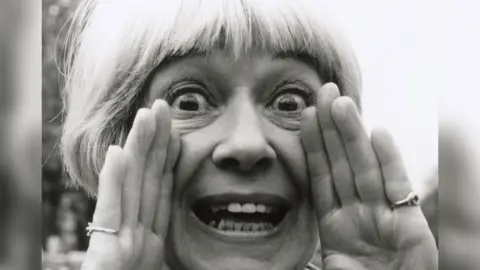 Lesbian activist Jackie Forster gets rainbow plaque
Lesbian activist Jackie Forster gets rainbow plaqueForster's activism is to be commemorated with a special plaque with rainbow stripes round it.
20 hrs agoLondon1 day ago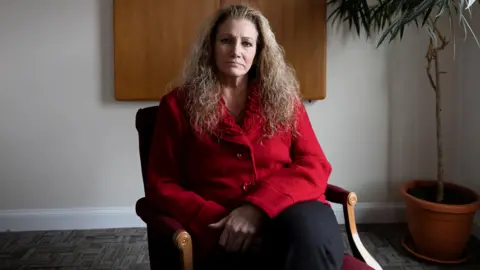 US Supreme Court hears arguments in 'straight discrimination' case
US Supreme Court hears arguments in 'straight discrimination' caseJustices appeared sympathetic to a woman who claims she was denied jobs because she is heterosexual.
1 day agoUS & CanadaAP by OMG
Asian-Promotions.com |
Buy More, Pay Less | Anywhere in Asia
Shop Smarter on AP Today | FREE Product Samples, Latest
Discounts, Deals, Coupon Codes & Promotions | Direct Brand Updates every
second | Every Shopper’s Dream!
Asian-Promotions.com or AP lets you buy more and pay less
anywhere in Asia. Shop Smarter on AP Today. Sign-up for FREE Product Samples,
Latest Discounts, Deals, Coupon Codes & Promotions. With Direct Brand
Updates every second, AP is Every Shopper’s Dream come true! Stretch your
dollar now with AP. Start saving today!
Originally posted on: https://www.bbc.com/culture/article/20250226-edward-ii-did-a-gay-love-affair-spark-a-14th-century-royal-crisis?ocid=global_culture_rss
